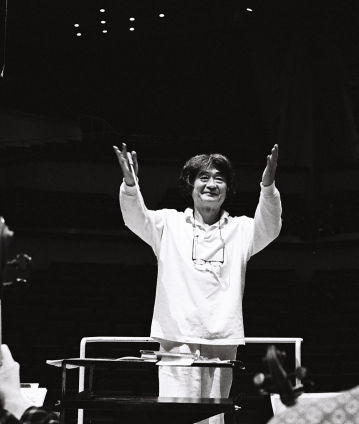Seiji Ozawa and the Berliner Philharmoniker

Seiji Ozawa enjoyed an extraordinary, mutually respectful partnership with the Berliner Philharmoniker. From his debut in 1966, the conductor demonstrated his thorough knowledge of the score, his clear body language and his approachability, all of which immediately earned him the respect and affection of the orchestra. Fifty years and numerous joint concert and recording projects later, the Berliner Philharmoniker appointed the Japanese conductor an honorary member. Our playlist is a tribute to Seiji Ozawa who would have turned 90 on 1 September 2025.
When Ozawa was appointed an honorary member in 2016, Knut Weber, cellist and orchestra board member, said, “Seiji Ozawa has been connected to us for many decades of joint, happy music-making. As a former assistant to Herbert von Karajan, this era lives on in him. As the first Japanese conductor of international standing, he forged another link with a country that has become a second home to the Berliner Philharmoniker. And as the conductor of many Philharmoniker premieres, he has time and again enabled us to make exciting musical discoveries.”
Ozawa studied conducting and composition in Tokyo before coming to Berlin on a scholarship to study under Herbert von Karajan. He gained valuable experience as Leonard Bernstein’s assistant in New York and through other engagements in the United States. He was music director of the Boston Symphony Orchestra and Vienna State Opera. With the Berliner Philharmoniker, he particularly impressed with the freedom and spontaneity that were always present in his interpretations, as well as his seemingly boundless energy – excerpts from Stravinsky’s Firebird provide a wonderful example of this.
A joint performance of Anton Bruckner’s First Symphony shows that the conductor consistently exposed the orchestra to less familiar repertoire. It had not been included in a Philharmoniker programme for a quarter of a century. The press subsequently painted a picture of the conductor that has not faded in the minds of audiences and orchestra members to this day, and will remain in their memories long after his death: Ozawa as a “timeless, mysterious magician at the conductor’s desk” and – since he conducted from memory – his “fond attentiveness to the musicians, who he bid farewell to with many handshakes at the end” (Klassikinfo).
Our recommendations
- Enigma Variations: Music with secret and cryptic messages
- On the silver screen: Classical music in film
- Our concertmaster’s perspective: Noah Bendix-Balgley’s favourites
- The Berliner Philharmoniker at the Easter Festival in Baden-Baden
- Director of the perfect sound: Herbert von Karajan with the Berliner Philharmoniker
- Richard Strauss and his tone poems